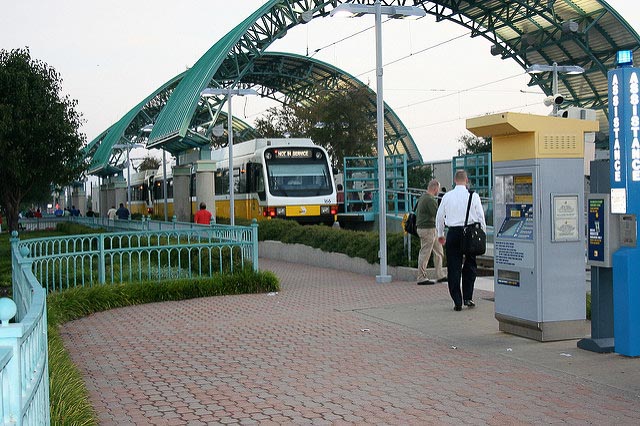 Dallas Area Rapid Transit was created when 15 North Texas cities voted to levy a 1 percent sales tax. Image via flickr/BBB World Service.
Dallas Area Rapid Transit was created when 15 North Texas cities voted to levy a 1 percent sales tax. Image via flickr/BBB World Service.By now, the dire annual warnings about the state of the country's infrastructure have become almost commonplace.
The American Society of Civil Engineers gives the country's infrastructure a "D+" rating. On the transportation front, it gives both transit and roads "D" ratings.
When Congress approved a new five-year, $305 billion transportation bill late last year, critics said although it slightly bumped up federal spending on transportation projects, it didn't go far enough. Moreover, it was widely viewed as relying on budgetary gimmicks.
Meanwhile, that transportation legislation passed more than six years after the previous long-term transportation bill expired. During that time, many state and localities grew increasingly anxious about whether they could truly rely on the federal government to support infrastructure investment.
The result of all this? Many transportation stakeholders continue to question the feds' long-term ability -- and commitment -- to funding roads and transit.
The good news, for cities, is that in some cases they're finding ways to generate infrastructure funding on their own.
But the bad news is that their ability to do this is largely dictated by states, resulting in a patchwork of uneven techniques, according to a new report by the National League of Cities. It summarizes the situation facing cities:
Declining funding, increasing mandates and misaligned priorities at the federal and state levels have placed responsibility squarely on local governments to maintain roads, upgrade water and wastewater systems and accommodate growing transit ridership. This represents a new federalism in which cities are taking the lead on issues historically driven by federal and state governments.
Undermining this new dynamic, however, is insufficient funding authority at the local level. The ability of cities to meaningfully address growing infrastructure challenges is bound by levers authorized to them by states.
So what's a city to do? It depends on the state.
- 29 states allow cities or counties to charge their own local sales tax to fund infrastructure. In 18 of those states, local voters must approve the tax.
- 16 states allow localities to charge a local motor fuels tax, which is generally used to fund transportation projects.
- 26 states allow local governments to charge their own local motor vehicle registration fees.
- 32 states authorize public-private partnerships in which -- ideally -- payment for a project is tied to performance,
- 27 states have authorized infrastructure banks, and they're active in 22 states. Infrastructure banks are state-run, revolving loan funds that can offer loans and credit assistance for infrastructure projects.
The NLC report goes on to note the advantages and pitfalls of each approach, as well as ways in which states sometimes limit cities' ability to implement them.
Interestingly, there are just two states -- Missouri and Virginia -- that authorize cities to use all five of those tools, (though voter approval requirements limit their use in Missouri). Meanwhile, another two states -- Kentucky and New Jersey -- are the only states that don't authorize cities to use any of these techniques.
Ultimately, NLC’s conclusions aren’t very rosy. It says that, overall, most cities have limited authority to use these creative funding tools, and additional requirements — such as voter approval requirements and county rules — makes the use of those tools especially challenging.
The organization notes that that cities are continuing to innovate and find other sources of infrastructure revenue. But, NLC concludes, "this patchwork of tactics will only take them so far."

